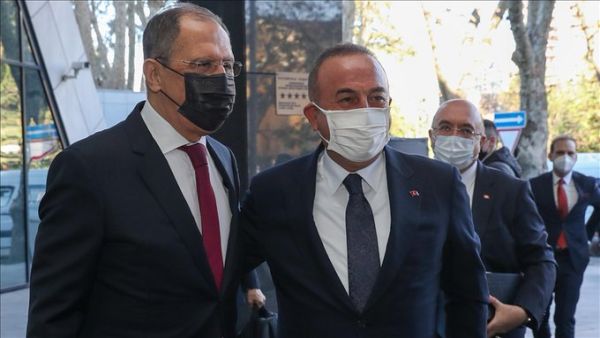The visit of Turkish Foreign Minister Mevlut Cavusoglu to the Russian capital Moscow showed that ties between Turkey and Russia have become more potent despite divergent interests on various Middle East files, including the conflicts in Syria and Libya.
The two countries’ strong ties and tendency towards rapprochement come amid increasing Western pressure on Turkey to reduce its regional and international expansion and curb its involvement in more than one country in the Middle East and Africa.
After the sanctions announcement, Turkey said it would not turn back on the S-400 system, and added that the US sanctions would not impact the country's defence industryhttps://t.co/z92RysCoDC
— Middle East Eye (@MiddleEastEye) December 29, 2020
In a sign of Moscow’s defiance of the West, particularly the United States, Russian Foreign Minister Sergei Lavrov said Tuesday that Moscow and Ankara’s military cooperation would not be deterred by US sanctions on Turkey for acquiring a Russian missile defence system.
Turkey, Russia discuss involving other countries in Nagorno-Karabakh ceasefire efforts https://t.co/ZvqxNlXvqj pic.twitter.com/iEF9vV2buD
— Reuters (@Reuters) November 25, 2020
US sanctions
Washington this month punished Turkey for buying Russia’s S-400 air defence system, imposing rare sanctions against a NATO ally.
US Secretary of State Mike Pompeo at the time told Cavusoglu that the American sanctions were intended to prevent Russia from receiving substantial revenues from the sale.
On Tuesday, Cavusoglu visited Moscow for talks with Lavrov, who told reporters, “we have confirmed our mutual intention to develop military ties with Turkey.”
He added that Russian President Vladimir Putin appreciated Turkey’s determination to “continue cooperation in this area despite continuing illegitimate pressure from Washington.”
Cavusoglu said the US sanctions against Turkey were “an act of aggression against our country’s sovereign rights,” adding that Ankara would not give in to pressure.
“We prefer to solve all issues including that of the S-400 through negotiations,” Cavusoglu said in comments translated into Russian.
Azeri's celebrating Nov 10 need to ask themselves the question: was invading Armenian homes with Azeri & Turkish military, & ISIS mercenaries, capturing & torturing 100's of pow's worth Turkey & Russia now having full control over Azerbaijan? https://t.co/xcsoYaISva
— Carla (@HCA002) December 1, 2020
“After introducing the sanctions the US announced it favours dialogue. We’ve never been against dialogue,” the Turkish foreign minister added.
Cavusoglu, however, stressed that Turkey’s relations with Russia are not an alternative to its ties with NATO and the European Union.
Turkey last year took delivery of the $2.5 billion system, defying warnings that such military cooperation was incompatible with NATO and would let Russia improve its targeting of US stealth planes.
The United States has decided to impose sanctions on Turkey for its purchase of Russian missile defenses—a confusing situation for two ostensible NATO allies. It’s the culmination of decades of misunderstandings, FP’s @KFJ_FP and @RobbieGramer write. https://t.co/v1VoitbZNu
— Foreign Policy (@ForeignPolicy) December 24, 2020
On different sides
Although Russia and Turkey are rivals in several conflicts, including Libya and Syria, Putin and his Turkish counterpart Recep Tayyip Erdogan seek to maintain good relations.
The two countries are jointly monitoring a Russian-mediated truce over the disputed Nagorno-Karabakh region after a six-week war between Armenia and Azerbaijan that claimed more than 6,000 lives.
Tensions between the two nations had risen over Nagorno-Karabakh while the fighting was ongoing, with Russia accusing Turkey of deploying Syrian fighters to combat Armenian forces in the contested region.
Earlier this month, Turkish police briefly arrested two Russian journalists in Istanbul for allegedly filming a drone production unit without permission.
In Syria, Moscow and Ankara have backed different sides.
Late on Sunday, Russia said it had sent more military police to an area in northern Syria where Turkey-backed fighters have clashed with Kurdish forces near a strategic highway patrolled by Russian and Turkish troops.
Battles between Turkey-backed fighters and Kurdish forces broke out near the town of Ain Issa in northern Syria earlier this month.
The town Ain Issa sits along the M4 highway that links major Syrian cities and where Russian-Turkish patrols usually take place.
Turkish forces and their Syrian insurgent allies seized territory in the region in an offensive last year against the Kurdish YPG militia which holds swathes of north and east Syria.
The Russian defence ministry said in a statement it had sent more military police to the area on Sunday.
Moscow, whose warplanes also patrol the area, also called on both sides to stop shelling each other and to de-escalate.
It said it had not detected shelling from Turkish-backed fighters in the last 24 hours.
This article has been adapted from its original source.








